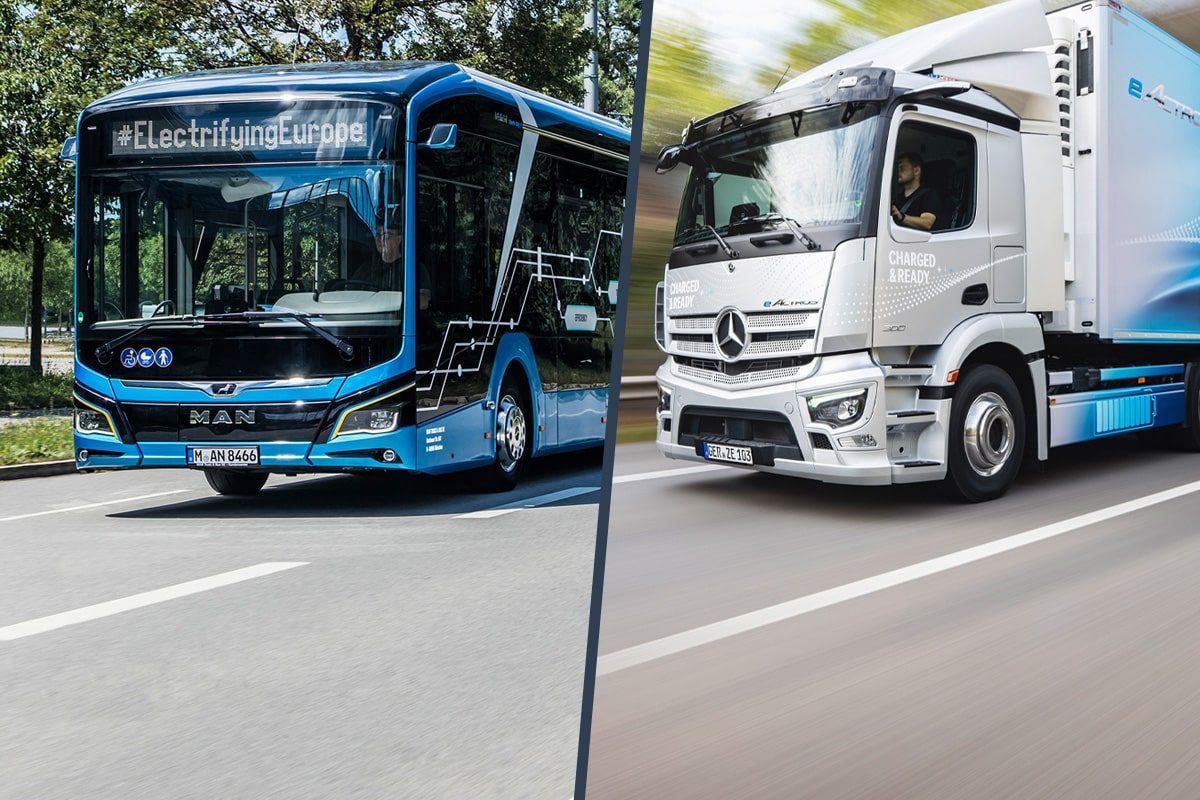
Registrations of electric commercial vehicles: two speeds in Europe
In the truck sector, the ACEA divides its statistics into different weight categories. The association lists all trucks weighing between 3.5 and 16 tonnes as medium-duty trucks and all vehicles weighing 16 tonnes or more as heavy-duty trucks. In the bus sector, the organisation zooms in on all vehicles over 3.5 tonnes intended for passenger transport.
5.2 % of all medium-sized trucks had a plug in 2023
The ACEA recorded an increase of 24.8 per cent across all drive systems for medium-duty trucks – from 42,642 in 2022 to 53,202 trucks in 2023. If the EFTA states of Iceland, Norway, Switzerland, and the UK are included, the number of new registrations reaches 67,596 units. 2,793 medium-duty electric trucks with a plug were registered in the EU (+229.4% compared to 2022).
The association does not generally differentiate between battery electric vehicles and plug-in hybrids but lists all externally chargeable vehicles together. However, PHEVs are rare in the truck sector, so most plug-in vehicles listed are likely to be purely electric. In any case, electrified medium-duty trucks accounted for 5.2 per cent of all new registrations in this sector. If EFTA states and the UK are included, the number of newly registered medium-duty electric trucks reaches 4,721 units, and the share of electric vehicles is 7.0 per cent.
With 1,560 electric trucks between 3.5 and 16 tonnes, Germany is at the top of the European country rankings. In 2022, the figure was 633 units, meaning growth in 2023 was 146.4 per cent. The Netherlands hold the second spot (766, +2.635%), followed by Spain (163, +98.8%) and Denmark (104, +147.6%). Outside the EU, the UK (1,220, +81.8%), Norway (510, +138.3%) and Switzerland (197, +177.5%) were also among the growth drivers in this area in Europe.
1% of new heavy goods vehicles electrified by 2023
Let’s move on to heavy trucks, defined by the ACEA as those with a gross vehicle weight of over 16 tonnes. The total EU market grew to 266,879 registered units in 2023 (+14.7 compared to 2022), or 275,618 heavy trucks including the EFTA states and the UK (+14.9). Trucks with plugs accounted for 2,486 units across the EU (+239.6% compared to 2022) and 2,886 units (+192.4%) in the extended scope, which means the share of electric vehicles was 0.9 and 1.0 per cent of new registrations, respectively.
Germany is also a pioneer when it comes to heavy-duty electric trucks: with 609 units, Germany recorded an increase of +256% compared to 2022, followed by France (551, +367%), the Netherlands (382, +334%), Sweden (289, +84%) and Denmark (212, +351%) in the Top Five. Registrations in the non-EU countries Norway (195, +30%), Switzerland (188, +81%) and the UK (286, +107%), are also in the three-digit range.
15.9% BEV and PHEV penetration in the EU bus market
In the bus sector, the ACEA statistics cover all newly registered medium-sized and large buses weighing 3.5 tonnes or more. In the European Union, the bus market grew by 32,593 buses across all drive systems in 2023. That is 19.4 per cent more registered vehicles than in 2022. 5,166 units had a plug. That corresponds to an increase of 39.1 per cent compared to the 3,715 electric buses with purely electric or plug-in hybrid drive registered in 2022. The share of BEVs and PHEVs in new registrations reached 15.9 per cent in the bus sector in 2023.
If the statistics include the EFTA states and the UK, the total number of registered buses is 39,944, including 7,242 electric buses, corresponding to a share of 18.1 per cent.
Germany is also setting the bar in the EU for the purchase of electrified buses – with 835 units registered. That is 29.3 per cent more than in 2022 (646 units). Looking at Europe as a whole, however, the top spot in 2023 belongs to the UK, with 1,314 new electric buses and a growth rate of 69.3 per cent compared to 2022.
Germany as an electric bus pioneer
The Omnibus.news portal also reports, citing excerpts from the statistics of the consulting firm Chatrou CME Solutions, that 753 electric buses with a total weight of over eight tonnes were on the road in Germany in 2023 – after 548 units in 2022 and 555 electric buses in 2021. That means the number of electric buses weighing more than eight tonnes has risen to 2,562 units in Germany. That is around 3.9 per cent of all buses in this weight category. According to government estimates, 50,000 to 55,000 vehicles are currently in use in public transport.
MAN led the manufacturer ranking last year. The Munich-based commercial vehicle manufacturer accounted for 246 of the 753 electric buses weighing at least eight tonnes. That corresponds to exactly one in three electric buses registered in Germany in 2023. In second and third place were Mercedes-Benz with 231 electric buses and Ebusco with 143 units.
But back to the ACEA’s EU statistics: the top five nations with the most electric bus registrations – BEVs and PHEVs from 3.5 tonnes – include France (743, -4.9%), Spain (525, +270%), Italy (410, +253%) and Portugal (385, +502%). In Europe as a whole, the UK – as mentioned with 1,314 new registrations – and Norway (563, +84.6%) stand out with high electric bus registration figures.
Single-digit registrations for electric commercial vehicles
Finally, let’s look at those nations in which there were hardly any electric commercial vehicle registrations in 2023. In the bus sector, Estonia and Croatia stand out with no or just one new electric bus in 2023. Single-digit electric bus registrations were recorded in Greece, the Czech Republic and Latvia. In the electric truck sector, several countries still need to register a single electric commercial vehicle. These include (in the medium-duty sector) Croatia, Estonia, Latvia, Lithuania and Greece. However, for example, Portugal, Slovenia and Slovakia are also exercising restraint in the heavy-duty electric truck sector. The ACEA has no figures for new electric bus and truck registrations from Bulgaria and Malta.
acea.auto, acea.auto (statistics, PDF), omnibus.news (in German)




0 Comments